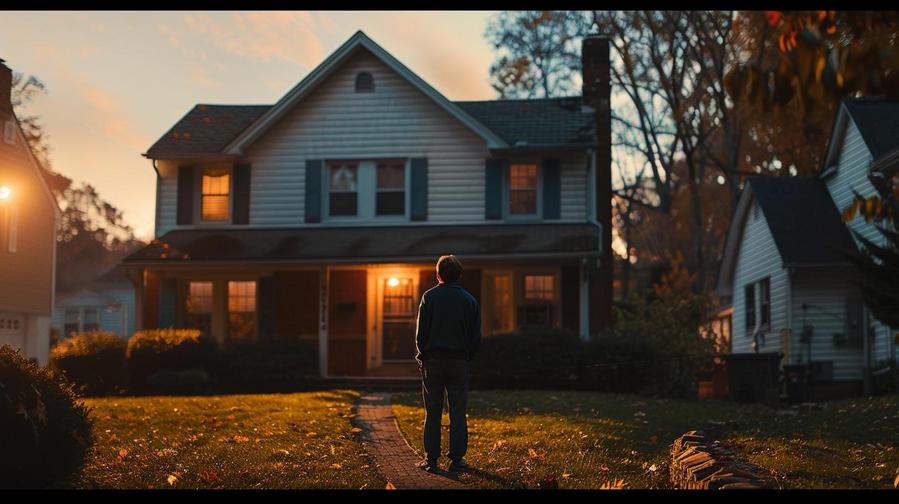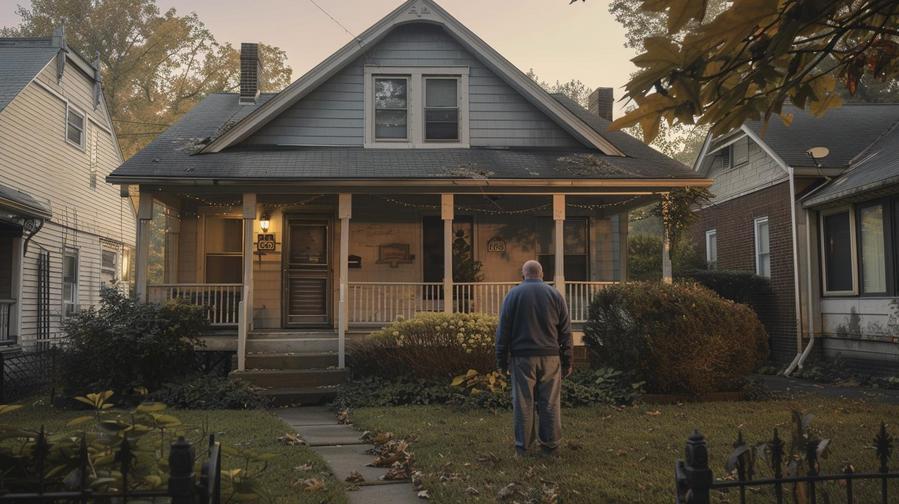Filing Chapter 7 but need to sell your house? You're not stuck. This guide dives into how you can still sell your property and possibly keep your equity. With Chapter 7, there are rules, but also opportunities. Whether it's timing the sale or navigating legal waters, we've got the insights. Let's break down the process, protect your interests, and move forward.
TL;DR:
- Chapter 7 Bankruptcy may require selling your home to pay debts, but homestead exemptions can protect some equity.
- Trustees manage asset sales, including homes; state laws affect exemption amounts.
- Selling your home either before or after Chapter 7 discharge needs careful timing due to legal implications.
- Consulting a bankruptcy attorney is crucial for navigating exemptions, understanding if/when you can sell your home, and planning future home purchases.
- Post-Chapter 7, waiting periods apply before qualifying for new mortgages (two years for FHA loans, longer for conventional).
- Chapter 13 offers an alternative to Chapter 7 by allowing debt repayment plans and potentially avoiding asset liquidation.

What Should You Know About Chapter 7 Bankruptcy Before Selling Your Home?
Understanding Chapter 7 Bankruptcy
Chapter 7 Bankruptcy lets you erase most of your debt. But it involves selling your assets. This includes your house, if needed, to pay your debts.
The Role of Bankruptcy Trustees in Selling Your Property
A court-appointed trustee handles the sale of your assets in Chapter 7. They manage the process and use the funds to pay creditors.
Homestead Exemption and Protecting Your Home’s Equity
Many states have a Homestead Exemption. This law lets you keep some of your home's value. The amount you can keep varies by state. You must check if this exemption covers funds from a home sale. If not, the trustee may need to sell your home to settle debts. You might think about Chapter 13 if you have a lot of home equity. This allows you to keep your home and settle debts with a payment plan.
Before you sell your property, make sure you know about your state's exemption laws. If your home's equity isn't fully protected, selling could mean losing the funds to trustees. When planning to buy another house after bankruptcy, remember, getting a new mortgage might take a while. Usually, you need a two-year wait after Chapter 7 for an FHA loan. For standard loans, it's even longer.
It's crucial to consult a bankruptcy attorney to navigate these issues effectively. They can guide you on protecting your asset and planning your next steps, including when and how you can buy another home.
How Can You Sell Your House After Filing for Bankruptcy?
Timing the Sale: Before Vs. After Bankruptcy Discharge
Selling your house after filing Chapter 7 is tricky. You must time it right. Planning is key here. If you sell before the bankruptcy discharge, the court might take the proceeds to pay creditors. This happens if your home equity isn't exempt. So, checking state laws is vital.
For instance, Texas and Florida offer unlimited homestead exemptions for your primary residence. This means you might keep your home sale proceeds, depending on specific rules. However, in other states like New Jersey or Ohio, the exemption cap is much lower, which might not cover all your equity.
Exempting Your Home Sale Proceeds
After you file Chapter 7, a trustee manages your assets. This includes your home, if needed, to repay debts. But with good planning, you can protect some or all proceeds from your home's sale.
How? Through exemptions. These laws allow you to keep vital assets. Each state has different rules on what you can keep and up to what value. Make sure a homestead exemption or another type covers your home. These exemptions aim to help you secure a fresh start post-bankruptcy without losing everything.
If selling your home before filing for Chapter 7, ensure your state's homestead exemption protects the proceeds. Usually, you get six months to two years to use these funds to buy another home.
Always consult a bankruptcy attorney for advice tailored to your situation. They can offer strategies based on your state’s laws and your specific financial picture.
Related Links:
–Can You Sell a House in Foreclosure? Know How
–Can You Sell a House with a Mortgage? Know How

What Are the Legal Considerations for Selling Your Home During Chapter 7?
Navigating State Exemption Laws
When you file Chapter 7 bankruptcy, you might still sell your home. First, check your state's exemption laws. These laws may let you keep some home equity safe from creditors. For example, Texas and Florida offer generous homestead exemptions, which means much or all of your home equity may be protected during bankruptcy.
In states with less generous exemptions, like New Jersey or Ohio, you might have less protection. You may need to pay some equity to creditors, or worse, the trustee could sell your home to settle debts.
The Implications of Selling Without Exemption Protection
If your home's equity isn't fully safe under exemption laws, selling your home during Chapter 7 can be tricky. Without exemption protection, the bankruptcy trustee has the right to sell your home. The proceeds first cover the homestead exemption amount. The rest pays your creditors.
Selling a home with no exemption protection leads to losing most or all sale proceeds to creditors. This situation drastically affects your fresh start after bankruptcy. You could end up with little or no money to move on and buy another home.
Before you decide to sell your home during or after Chapter 7, it is vital to understand these risks. Also, consider consulting with an expert to navigate the complexities of bankruptcy laws. A professional can guide you on whether your home's equity can be exempted, how much you might yield from a sale, and if it's a wise decision to sell at all during this period.
How Does Filing Chapter 7 Bankruptcy Affect Your Ability to Buy a New Home?
When you file for Chapter 7 bankruptcy, can you buy a new home right away? No, you usually need to wait two years after your bankruptcy discharge. This wait is crucial for reestablishing your credit and qualifying for a new mortgage.
This waiting period is key for those looking at FHA mortgages. After this bankruptcy, FHA loans are the first accessible option for many. They need two years of financial stability and credit repair before you can apply.
For conventional loans, the outlook is a bit longer. You might wait up to four years after your bankruptcy discharge. Each lender has their own rules, so it pays to shop around.
So, planning and credit rebuilding are vital. They ensure you can move towards buying a home after facing bankruptcy. Always consider your legal and financial position carefully. Consulting professionals like financial advisors or bankruptcy attorneys can provide targeted guidance relevant to your unique situation.

Can You Sell Your House and Keep the Equity After Chapter 7 Bankruptcy?
Understanding Equity Protection Rules
Can you keep your home equity after Chapter 7 bankruptcy? Yes, if your state allows a homestead exemption. This exemption can protect some or all equity in your home. However, exemption limits vary by state. Check the limits where you live.
Strategies to Maximize Home Equity Retention
To keep most equity, follow a few tips. First, learn your state's homestead exemption amount. This is key. If your home's equity fits within this limit, you may keep your home. If not, a trustee could sell it. They use the sale money to pay creditors. Next, consider if Chapter 13 bankruptcy might be a better choice. Chapter 13 lets you pay back debt and keep assets like your home. Clear advice from a bankruptcy lawyer is important. Plan well to protect your home and start fresh.
Chapter 13 Vs. Chapter 7: How Do They Differentiate in Property Selling?
Comparing Asset Liquidation and Exemptions
Chapter 7 lets the trustee sell your assets to pay debts. You might keep some assets. Chapter 13 lets you keep assets and repay debts over time.
In Chapter 7, if you file bankruptcy, a trustee may sell your home unless it falls under a state-specific homestead exemption. This exemption lets you keep some or all equity in your home. But exemption amounts are not the same in all states. Some states let you keep more home equity than others. You can learn more about this at AllmandLaw.
If your home’s equity surpasses these limits, the trustee might sell your home to pay creditors. This could mean losing your home if you can't protect all the equity under Chapter 7 rules. Precision
Chapter 13 sounds different. It deals more gently with your assets. Here, instead of selling assets, you plan to pay off debts using your income. This might include making payments toward unexempt home equity. Chapter 13 might work better if your home equity is higher. It lets you avoid outright asset sales by spreading payment of unexempt equity across your repayment plan duration.
In both cases, knowing your state’s exemption laws is key. They affect how much of your home you can truly keep. Always check these before deciding between Chapter 7 or Chapter 13, especially if keeping your home is a priority.

Practical Steps to Selling Your Home After Chapter 7 Bankruptcy
Preparing Your Home for Sale
Before you sell your house after Chapter 7, check your state’s homestead exemption. This rule helps keep money from the sale safe from creditors. Each state has different limits on how much money you can keep.
Next, fix up your house to get a good price. Clean well and make small repairs. This helps attract buyers who can pay quickly and fairly.
Finding the Right Buyer During Bankruptcy
Finding a buyer while in Chapter 7 needs careful steps. The court’s trustee handles selling your assets, including your home, to pay creditors. To sell your home yourself, get the court’s okay first. This helps ensure the sale meets legal needs and benefits you, not just your creditors.
Selling to a cash buyer can make this process smoother and faster. Consider using services like Sundae, who specialize in buying homes for cash. They understand the specifics of bankruptcy sales.
In all, selling your home after filing Chapter 7 is complicated but possible. Always work with a bankruptcy attorney to guide you through this tricky process. They can help you understand if your sale will meet court and legal standards.
Consultation and Professional Guidance on Bankruptcy and Home Sales
Why Consulting a Bankruptcy Attorney is Critical
If you filed for Chapter 7, talk to a bankruptcy lawyer first before selling your home. A lawyer knows if state laws can protect your home's value. You might not have to sell your home. The law may allow you to keep some or all money from a home sale.
Each state has different rules about house and money protection. Some states let you keep a lot of money from the sale; others do not. This money shield is called a homestead exemption. Find a bankruptcy attorney near you to understand these details better. They will tell you how your home sale fits into your bankruptcy plan.
Choosing the Right Time to Consult with Professionals
The best time to get legal advice is before you decide to sell. A lawyer can guide what works best for your financial future. Sometimes it's smarter to sell before filing for bankruptcy. Other times, it’s better to wait until after. If you sell without knowing the laws, you could lose the sale money. This happens if your exemptions don't cover all the equity.
Remember, the law often gives you a period, like six months to two years, to use the money from the sale to buy another home. If you don’t, that money might go to your creditors. Bankruptcy trustees, who the court names to manage your case, may sell the house if it's more valuable than your exemptions cover.
Always consult with an expert early. They help you avoid mistakes and plan with knowledge about your state's laws and your financial options. This planning is crucial for moving forward after bankruptcy.
This post gave you the lowdown on selling your home after Chapter 7 bankruptcy. We covered the basics, legal stuff, and smart moves to keep your equity. Remember, timing and the right advice matter. Bankruptcy doesn't end your home selling dreams. It's about knowing the rules and playing smart. Keep these tips in hand, and you'll navigate this journey just fine.











